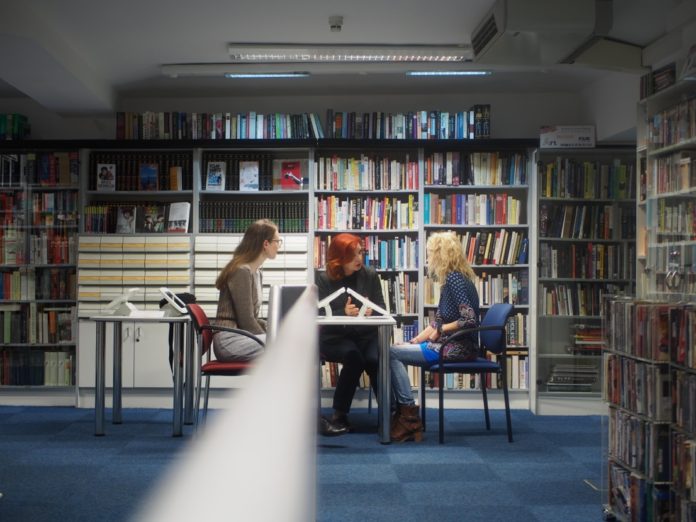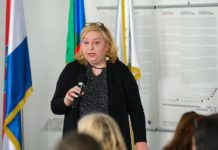Jasna Kovačević is a senior and head librarian at the Bogdan Ogrizović City Library in Zagreb. With her work, which this year received the City of Zagreb – Zagreb Woman of the Year Award, she has turned this Library into a real book centre where they present books and magazines, hold public lectures and exchanges with international writers, mark anniversaries, and the like.
In the beautiful Library space we started our interview with her memories of the very first days at the Bogdan Ogrizović City Library.
Taking into consideration your work and your long-time experience, how does one become an outstanding librarian?
Thank you for this statement, I am not exactly an outstanding librarian, I prefer to say a librarian who is passionate about doing her job. Thirty-one years ago I started working in Zagreb, in Bogdan Ogrizović City Library Children’s Department as a librarian and head of the reference desk for children and teenagers where I worked with children every day. I was working a lot with Ibrahim Kajan, children’s literature writer who was helping the writers and writing reviews, while writers such as Pajo Kanižaj, Sunčana Škrinjarić, Tito Bilopavlović and Ivan Kušan were regular visitors to our Department. I believed it was useful to organize meetings with children who had huge possibilities to learn from these people, with great writing and life experiences. I personally experienced it during my schooling in Slavonski Brod where great writers visited us often. For example, it will remain as an unforgettable memory for me when Oskar Davičo, a Serbian poet, novelist, essayist and scriptwriter, visited my high school senior class.
I have believed that public libraries with very diverse structure of members and users need to open up to everyone and become a meeting place for writers and readers because they are centres with multiple, educational, cultural and social role.
A good librarian is characterized by love of books, reading and love of another human being. University graduation is just a start, we have determined what our occupation will be, providing us thus a kind of ticket for life education. When I graduated the Yugoslavia Languages and Literature Study Programme at the Faculty of Humanities and Social Sciences, I started working as a high school teacher. That was my first job. Although during my study I was gaining teaching practice experience both in elementary and high schools, when I entered the classroom where there were about thirty students waiting for me I asked myself – have I learned how to be a teacher and how will I hold the attention of these young people and besides teach them something? The answer came by itself – everything works if you like what you do.
Since we have had a long tradition of public libraries, how much has the role of a library changed from your beginning until today?
The main activity of the library, which is the acquisition of library and non-library materials and access to borrowing, remained the same. There has been a change in the library atmosphere, which have become, from silent institutions where people would came only when they needed a specific book, for example, for a required reading or for a paper, the so-called Third Space. It is here where the users spend a large part of their free time between work and going home. In Croatia, this is even more pronounced in relation to other countries, especially those where the standard of living permits people to buy books they want to read. Our citizens are more attached to libraries because the annual subscription fee of 50 HRK allows them to borrow and read books from as many as 42 libraries connected in the library network. Neighbourhood library model was first introduced in Austria and Germany, and we have maintained it because the need for the book justifies it. Zagreb libraries are frequently visited and always full.
For your long-time professional activity this year you have been awarded City of Zagreb – Zagreb Woman of the Year Award. How do you perceive your work and consequently how do you perceive this Award?
At first, when I found out about this Award I was caught by surprise because I am the person from behind the scene not so much exposed in the media. It is a special honour for me that the Croatian Writers’ Society presented my candidature for this Award. My happiness equals the happiness of my colleagues because this Award has brought attention to libraries as well-established professional institutions doing a great job. Without any marketing advertising we manage to fully raise awareness and realize our cultural and educational role in society. I take a lot of pleasure in my job, and since I spend most of my time in Bogdan Ogrizović City Library in Zagreb, I feel at home there.
What kind of books do you like reading, what kind of literature do you prefer?
Since I was a child I loved reading. I used to work in the school library but then I did not know that it would become my future job. A large number of books were at my disposal and I remember that I was devouring novels by Marija Jurić Zagorka.
You are marked by every book you read. Several years ago I read Memoirs of Hadrian written by Marguerite Yourcenar and I love coming back to it. By genre it belongs to historical fiction and it is about the life and death of Roman Emperor Hadrian who at the end concludes that life in its essence is all the same, whether you are rich or poor, you feel the same pain and you die the same way. The most recent book I have read is A Cage for a Clay Pigeonby Robert Međurečan whose work I follow. I was impressed by Skin Coloured Cloudby Nebojša Lujanović, whom I consider to be a wonderful man and a writer. You can feel that he was interested in what he was writing about, so to speak, he lived his prose. Generally speaking, in the last two years there has been an extremely increased reader’s interest in Croatian literature and everything goes – poetry, prose and drama. We have very good female writers, for example, we recently presented a collection of short stories by Ksenija Kušec, who is a real master of short stories.
Sometimes I read a book at a recommendation from our uses. Hence, some time ago a lady recommended me a mystery novel The Wolf and the Watchmanwritten by a Swedish author Niklas Natt och Dag, which I would have never chosen myself because I prefer historical fiction and magical realism. In the end I was thrilled because it was not a classical mystery novel, but it was also a historical novel about Sweden in the 18th century.

How do you perceive minority libraries, do you have any piece of advice for example for the Croatian Rromani Union “KALI SARA” who is planning to open a Central Rromani Library in Croatia?
Long time ago I talked to the late Kasum Cana about the Rromani library. We socialized often and during those informal conversations he would often mention the possibility of having a Rromani corner in our Bogdan Ogrizović City Library.
We do not have enough space for that. However, such a corner exists in the Silvije Strahimir Kranjčević City Library and in the Medveščak City Library in Zagreb. We welcome the project of launching a Rromani library by the “KALI SARA” Union with which we have collaborated on several projects, and if needed we will happily support this one as well.
When opening a library, it is extremely important to interact with people in order to get to know the environment you are in and to get information on what kind of literature people in that community are interested in. Also, sometimes there is a need to avoid the trap of segregation because if in a library, like in ours, there is a department with books written in seven languages, that means that everyone can choose and read a book if they speak one of these seven languages, regardless of their national affiliation.
How do you see the future of libraries in view of increased number of electronic books?
Every two years we do various researches, and we have also launched a pilot project for electronic and audio books. The last research that we conducted in 2018, well aware of the digitization of literary materials, addressed the interest for electronic books in libraries.
Relatively small, but still relevant sample, proved that the electronic book was more interesting to students than to the public libraries users where the use of such services amounts to 20% of the total demand for books. This is probably due to the difference in literature, which is largely in the form of scientific articles for students. Thus, for example, the library at the Zagreb Faculty of Humanities and Social Sciences recorded an increase in interest in reference books in electronic form.
In conclusion, I can say that people are still more attached to a printed book and that all other media can exist in parallel with the book. I like to say that you will go to bed with a book, but not with a laptop.
There are some interesting researches carried out in other countries. For example, a survey conducted by London University library science students in 2015 showed that students prefer printed books because, while they learn, they often memorize the content visually as well. For example in Finland, a digital collection library has recorded a drop in reading, and a research has shown that the electronic media is great for seeking information, but not for real learning. Surfing the internet very quickly takes you in different directions and after, for example, two hours of surfing you have actually learned very little, unlike the knowledge gained during two hours spent on reading books.
What are the most popular books among users?
As people are different, so are the types of literature they prefer. Most popular are new releases of all genres. Nowadays when we talk about new releases we are financially limited because in the past we were able to buy some ten copies of a new book, something that today we cannot afford. That is why it is good that there is a network of libraries and book databases on the webso readers can still read the book they want even if it means borrowing it in a library that is a bit further away from their neighbourhood.
There is always a demand for literary classics that you like reading throughout your life, such as The Bridge on the Drinaby Andrić which you first read at school, later at college, and again later in your life, you reach for that book and you enjoy it over and over again.
Those who read at a young age will keep up the habit throughout their life so we should foster a love for book from infancy. In our society, we should clearly prioritize the book over, for example, a mobile phone, especially when it comes to children, otherwise we will become a society of completely alienated people, and I am sure we do not want that.












